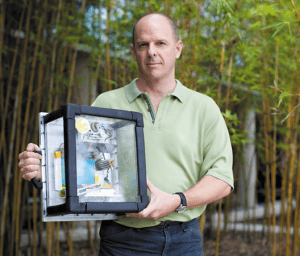In the field of space science, UCF is a shining star

Dr. Joshua Colwell, College of Sciences, holds an impact chamber from the Physics of Regolith Impacts in Microgravity Experiment (PRIME), designed for microgravity and reduced gravity parabolic airplane flights. The results help scientists understand the early stages of planet formation, the evolution of Saturn’s rings, and the working environment for astronauts and robots on the surfaces of the moon and asteroids.
While the space-related buzz these days revolves around the more than 7,000 shuttle-related jobs eliminated in Central Florida, Britt and his colleague Dr. Joshua Colwell have reason to be optimistic.
Colwell, a professor in the Department of Physics’ Planetary Sciences group and interim assistant director of the Florida Space Institute, says, “Overall, the space program and UCF still have a number of points of intersection. NASA has budgeted $5.4 billion just for science. That’s a significant amount of money for scientific research.”
Britt agrees. “The problem the space industry has is that it’s still very expensive to get into space, and NASA has limited funds. Up to now, a big chunk of NASA was committed to getting humans into space, but today, the science continues on, and UCF is doing pretty well in that.”
Colwell is a member of the science team on the Cassinimission to Saturn, and his experiments have flown on a space shuttle, as well as on suborbital flights, including rockets and parabolic airplanes.
Earlier this year, Dr. Joseph Harrington and doctoral student Kevin Stevenson led a team that detected UCF’s first planet, named UCF-1.01, which is located 33 light-years away.
Dr. Humberto Campins, an international expert on asteroids and comets, is involved in a mission to collect samples from a nearby asteroid. The samples, Campins says, “should be rich in primitive materials, specifically organic molecules and hydrated minerals from the early days of our solar system. If successful, it could give us clues about the birth of water and life in our world.”
